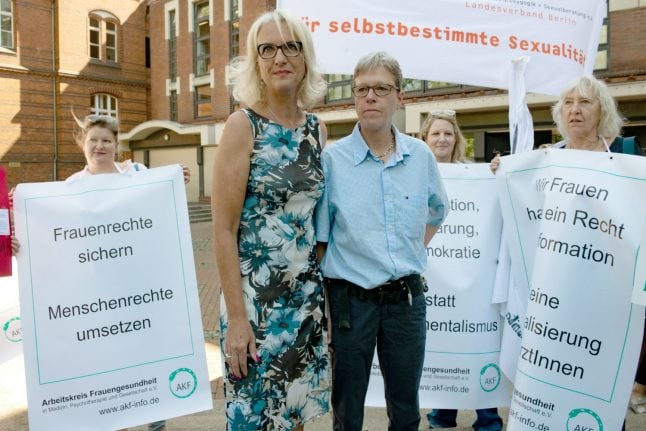German law allows abortions but effectively discourages them through various hurdles, including the law in question, article 219a, which dates to May 1933, shortly after Adolf Hitler took power in Nazi Germany.
After an uproar over another recent case, the government early this year lifted a blanket ban on publicizing abortion services.
Under the eased rules, gynaecologists, hospitals and public health services are allowed to share essential information about where women can terminate unwanted pregnancies.
SEE ALSO: What you need to know about the abortion battle that divides Germany
However, the two gynaecologists identified only as Bettina Gaber and Verena Weyer still fell foul of the amended law because they “not only provided information about whether but also about how the termination of pregnancy is carried out,” the Berlin court said.
“Doctors should in principle only indicate that they carry out abortions,” added the court, imposing a fine of €2,000 on each gynaecologist.
On their website, the doctors said they offered “medicinal, anaesthesia-free abortion” in a “protected environment”.
Both defendants voiced disappointment at the ruling and said they would mount an appeal.
They argued that the law in question flouted their freedom of occupation, freedom of opinion and freedom of information for patients.
“It's so awful, my stomach turned,” said Gaber of the ruling.
'Criminalises doctors'
After an uproar over another gynaecologist who was fined last year for publishing information on abortion services on her website, Chancellor Angela Merkel's coalition government in February eased Article 219a.
But critics, including the Greens, have argued that the law should be scrapped altogether.
Ahead of Friday's hearing, about 100 people demonstrated in front of the court, calling for the doctors' acquittal.
Joining critical voices against the ruling, Berlin's justice minister Dirk Behrendt said the court decision “shows that the revised Article 219a continues to criminalize doctors”.
He added that he will push for the city-state of Berlin to file anew a demand at Germany's upper house of parliament for the article to be scrapped.
Germany, despite being a leading voice for women's rights in the 1970s, imposes tight restrictions on abortion, permitting it only under strictly regulated circumstances.
SEE ALSO: Germany's plans to change controversial abortion laws
It is left out of universities' course books for student doctors and kept unavailable in swathes of the country.
A woman who wants to abort within the first trimester is required to attend a consultation at a registered centre.
The aim of the interview is to “incite the woman to continue the pregnancy,” according to the rules, even if in the end she has the final say.
Excluding special circumstances such as a pregnancy that threatens the life of the mother, or one arising from rape, abortion is not a procedure that is reimbursable by health insurance.
In some regions, including in the predominantly Catholic state of Bavaria, it may be necessary to travel 100 kilometres to find a doctor who performs the procedure.
Germany records an average of 100,000 abortions for 790,000 births, abouthalf the rate of neighbouring France.



 Please whitelist us to continue reading.
Please whitelist us to continue reading.
Member comments